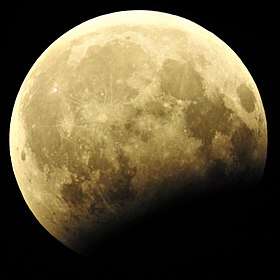September 1960 lunar eclipse
A total lunar eclipse took place on September 5, 1960. The moon passed through the center of the Earth's shadow.[1]
| Total Lunar Eclipse September 5, 1960 | |
|---|---|
| (No photo) | |
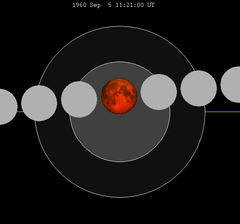 The moon passes west to east (right to left) across the Earth's umbral shadow, shown in hourly intervals. | |
| Series | 127 (39 of 72) |
| Duration (hr:mn:sc) | |
| Totality | |
| Partial | |
| Penumbral | |
| Contacts | |
| P1 | UTC |
| U1 | |
| U2 | |
| Greatest | |
| U3 | |
| U4 | |
| P4 | |
This is the 39th member of Lunar Saros 127. The previous event is the August 1942 lunar eclipse. The next event is the September 1978 lunar eclipse.
Visibility
It was visible over the Pacific Ocean, and seen rising over Asia and Australia, and setting over North and South America.
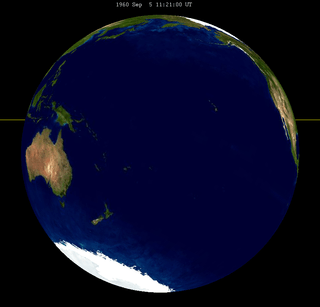
Related lunar eclipses
Lunar year series
| Ascending node | Descending node | |||||
|---|---|---|---|---|---|---|
| Saros | Date Viewing |
Type Chart |
Saros | Date Viewing |
Type Chart | |
| 102 | 1958 Apr 4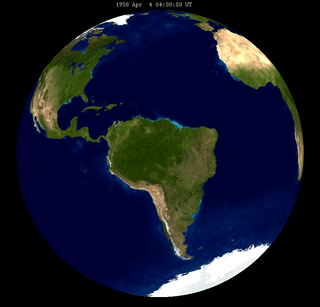 |
Penumbral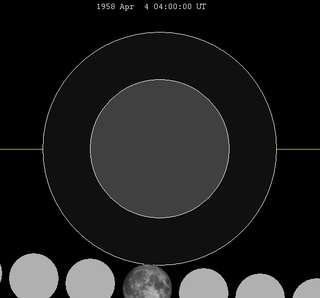 | ||||
| 112 | 1959 Mar 24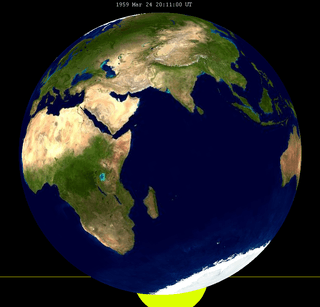 |
Partial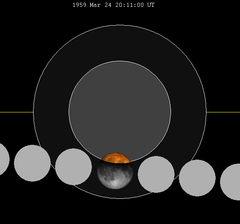 |
117 | 1959 Sep 17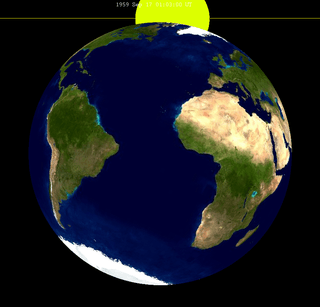 |
Penumbral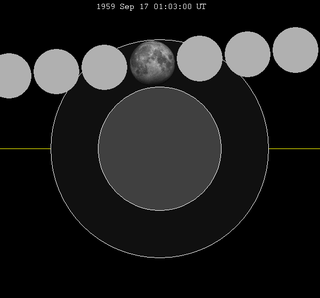 | |
| 122 | 1960 Mar 13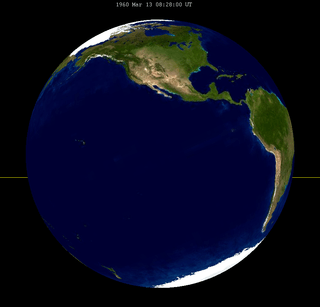 |
Total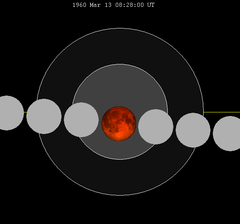 |
127 | 1960 Sep 5 |
Total | |
| 132 | 1961 Mar 2 |
Partial |
137 | 1961 Aug 26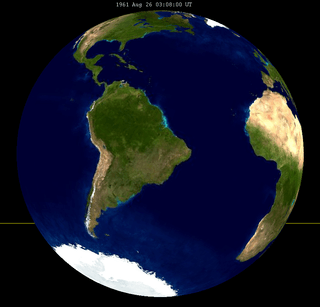 |
Partial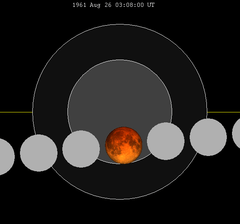 | |
| 142 | 1962 Feb 19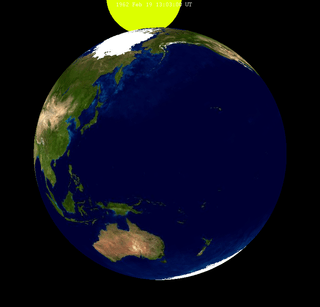 |
Penumbral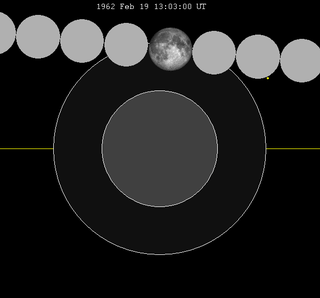 |
147 | 1962 Aug 15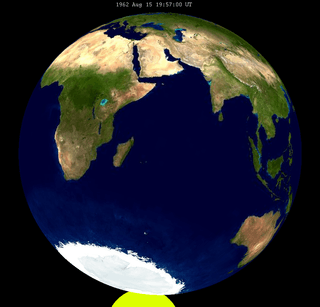 |
Penumbral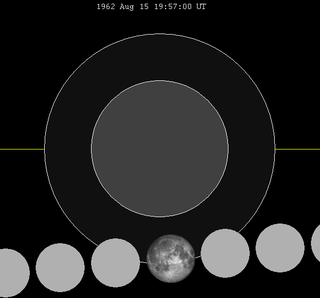 | |
| Last set | 1958 May 3 | Last set | 1958 Oct 27 | |||
| Next set | 1963 Jan 9 | Next set | 1962 Jul 17 | |||
Saros series
Lunar saros series 127, repeating every 18 years and 11 days, has a total of 72 lunar eclipse events including 54 umbral lunar eclipses (38 partial lunar eclipses and 16 total lunar eclipses). Solar Saros 134 interleaves with this lunar saros with an event occurring every 9 years 5 days alternating between each saros series.
| Greatest | First | |||
|---|---|---|---|---|
The greatest eclipse of the series occurred on 1888 Jul 23, lasting 102 minutes. |
Penumbral | Partial | Total | Central |
| 1275 Jul 09 | 1473 Nov 04 | 1798 May 29 | 1834 Jun 21 | |
| Last | ||||
| Central | Total | Partial | Penumbral | |
| 1960 Sep 05 | 2068 Nov 09 | 2429 Jun 17 | 2555 Sep 02 | |
| 1906 Aug 04 | 1924 Aug 14 | 1942 Aug 26 | |||
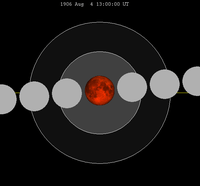 |
 |
 |
 |
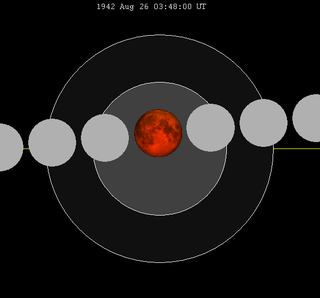 |
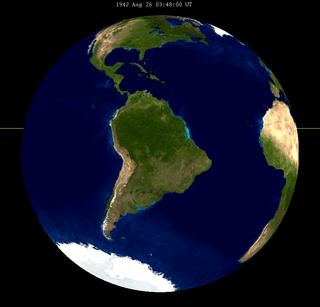 |
| 1960 Sep 05 | 1978 Sep 16 | 1996 Sep 27 | |||
 |
 |
 |
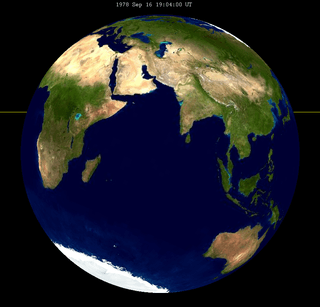 |
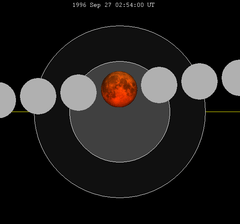 |
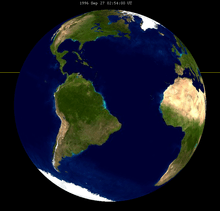 |
| 2014 Oct 08 | 2032 Oct 18 | 2050 Oct 30 | |||
 |
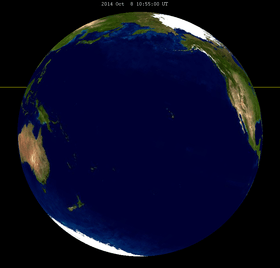 |
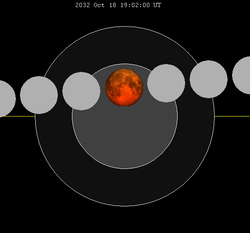 |
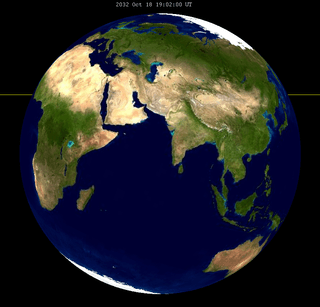 |
 |
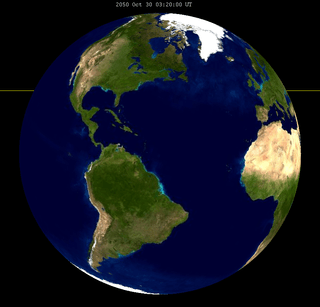 |
| 2068 Nov 09 | |||||
 |
 | ||||
gollark: Maybe I am to operate a URL shorternererer.
gollark: Oh, I assumed it was some sort of memetic hazard.
gollark: I have a SAT solver. I'm just not using it.
gollark: Maybe I need a SAT solver.
gollark: Apioform #3462323 was lying about that.
See also
- List of lunar eclipses
- List of 20th-century lunar eclipses
This article is issued from Wikipedia. The text is licensed under Creative Commons - Attribution - Sharealike. Additional terms may apply for the media files.
